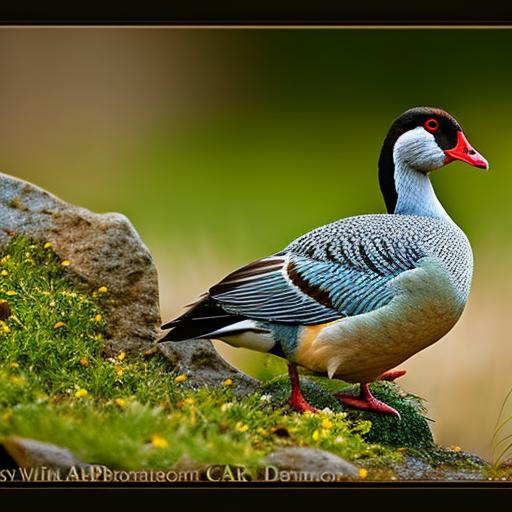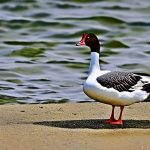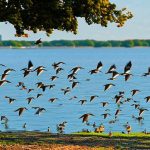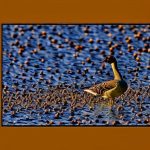Geese are large waterfowl that are known for their distinctive honking sound and V-shaped flying formation. They are found in many parts of the world and are known for their adaptability and intelligence. Geese are social animals that live in flocks and are highly territorial. They have a strong instinct to protect their nesting sites and will aggressively defend their territory.
Understanding the behavior of geese is important in effectively deterring them from your yard. By understanding their habits and instincts, you can implement strategies that will make your yard less attractive to geese and discourage them from settling in your property.
Key Takeaways
- Geese are social birds that mate for life and can live up to 25 years.
- Geese can cause damage to your yard by eating grass, leaving droppings, and being aggressive towards humans and pets.
- Natural ways to deter geese include planting certain types of vegetation, using noise deterrents, and removing food sources.
- Physical barriers such as fences, netting, and hedges can keep geese out of your yard.
- Repellents and deterrents such as sprays, lasers, and decoys can also be effective in keeping geese away.
The problems caused by geese in your yard
Geese can cause a range of problems when they invade your yard. One of the most common issues is damage to property and landscaping. Geese have a voracious appetite and will graze on grass, plants, and crops, causing damage to lawns and gardens. They can also trample on plants, leading to further destruction.
Another problem caused by geese is the health hazards associated with their droppings. Goose droppings can carry bacteria such as E.coli and salmonella, which can contaminate water sources and pose a risk to humans and pets. The accumulation of droppings can also create an unsightly mess and an unpleasant odor.
In addition to property damage and health hazards, geese can also be noisy and aggressive towards humans and pets. Their honking can be loud and disruptive, especially during nesting season when they are more protective of their territory. Geese may also become aggressive if they feel threatened or if they perceive a potential threat to their young.
Natural ways to deter geese from your yard
There are several natural methods that can be used to deter geese from your yard. One effective strategy is planting certain types of vegetation that geese find unappealing. Geese prefer to graze on short, tender grass, so planting taller grasses or native plants can make your yard less attractive to them. Additionally, planting shrubs or trees near water sources can create a physical barrier that discourages geese from entering your property.
Using noise deterrents can also be effective in deterring geese. Wind chimes or water sprinklers that make noise when activated can startle geese and make them uncomfortable. This can discourage them from settling in your yard. Installing motion-activated lights can also be effective, as geese are sensitive to sudden changes in light and may be deterred by the presence of lights.
Physical barriers to keep geese out of your yard
Physical barriers can be an effective way to keep geese out of your yard. Fencing options such as chain-link or electric fences can create a physical barrier that prevents geese from entering your property. It is important to ensure that the fence is at least 3 feet high and extends underground to prevent geese from digging under it.
Netting can also be used to cover ponds or other water features in your yard. Geese are attracted to water and will often settle near ponds or lakes. By covering these water sources with netting, you can prevent geese from accessing them and discourage them from staying in your yard.
Landscaping with rocks or other obstacles can also deter geese from entering your yard. Geese prefer open spaces where they have a clear line of sight, so creating obstacles such as rocks or hedges can make your yard less appealing to them.
Repellents and deterrents for geese
There are several commercially available sprays and granules that are designed to repel geese. These products typically contain natural ingredients such as grape extract or methyl anthranilate, which create an unpleasant taste or smell for geese. These repellents can be sprayed on grass, plants, or other areas where geese are likely to graze.
Homemade solutions can also be effective in deterring geese. Vinegar or garlic spray can be mixed with water and sprayed on grass or plants to create an unpleasant smell that geese find unappealing. Ultrasonic devices that emit high-frequency sounds can also be used to deter geese. These devices emit sounds that are unpleasant to geese but are not audible to humans.
Creating an uninviting environment for geese

Creating an uninviting environment for geese is another effective way to deter them from your yard. Removing food sources such as bird feeders or fallen fruit can discourage geese from settling in your yard. Geese are attracted to areas where they can easily find food, so by removing these food sources, you can make your yard less appealing to them.
Keeping grass trimmed short can also discourage geese from settling in your yard. Geese prefer to graze on short, tender grass, so by keeping your grass trimmed, you can make it less attractive to them. Additionally, covering or removing potential nesting sites such as shrubs or bushes can discourage geese from nesting in your yard.
The importance of maintaining a clean yard to keep geese away
Maintaining a clean yard is important in keeping geese away. Regularly cleaning up droppings and debris can make your yard less attractive to geese. Geese are attracted to areas where they can easily find food and water, so by keeping your yard clean and free of debris, you can discourage them from settling in your property.
Keeping water features clean and free of algae is also important in deterring geese. Geese are attracted to water sources and will often settle near ponds or lakes. By regularly cleaning and maintaining your water features, you can make them less appealing to geese.
Using decoys to scare geese away from your yard
Using decoys can be an effective way to scare geese away from your yard. There are several types of decoys available, including plastic or wooden replicas of geese or other predators. These decoys can be placed in your yard to create the illusion of a larger flock or to mimic the presence of a predator.
Proper placement and maintenance of decoys is important in ensuring their effectiveness. Decoys should be placed in areas where geese are likely to settle, such as near water sources or on open grassy areas. It is also important to regularly move and maintain the decoys to prevent geese from becoming accustomed to their presence.
The benefits of hiring a professional to handle geese control
While there are many methods that can be used to deter geese from your yard, it can be beneficial to hire a professional to handle geese control. Professionals have expertise in humane and effective methods for deterring geese and can provide guidance on the best strategies for your specific situation.
Professionals also have access to specialized equipment and products that may not be readily available to homeowners. This can include deterrents such as laser devices or trained dogs that can effectively scare geese away from your yard.
Conclusion and final tips for keeping geese away from your yard
In conclusion, understanding the behavior of geese and implementing effective strategies can help keep them away from your yard. By planting certain types of vegetation, using noise deterrents, installing physical barriers, and using repellents, you can create an uninviting environment for geese. Additionally, maintaining a clean yard, using decoys, and seeking professional help when needed can further enhance your efforts in deterring geese. With persistence and consistency, you can successfully keep geese away from your yard and protect your property and landscaping.
If you’re looking for effective ways to keep geese away from your yard, you might also be interested in learning how to create a secure and predator-proof floor for your chicken coop. A well-designed coop floor not only keeps chickens safe but can also deter other unwanted visitors, such as geese. Check out this informative article on poultrywizard.com that provides valuable insights and tips on creating the perfect floor for your chicken coop. Click here to read more about it.
FAQs
What are some common reasons for wanting to keep geese away from your yard?
Geese can cause damage to lawns, gardens, and crops. They can also leave behind droppings that can be unsightly and unsanitary. In addition, geese can be aggressive and may pose a threat to small pets or children.
What are some natural ways to keep geese away from your yard?
Some natural ways to keep geese away from your yard include planting tall grasses or shrubs around the perimeter of your property, using decoys or scare devices such as balloons or reflective tape, and using noise deterrents such as wind chimes or motion-activated sprinklers.
What are some non-natural ways to keep geese away from your yard?
Non-natural ways to keep geese away from your yard include using chemical repellents, installing physical barriers such as fences or netting, and hiring professional wildlife control services.
Are there any legal restrictions on how to keep geese away from your yard?
Yes, there may be legal restrictions on how to keep geese away from your yard. It is important to check with your local wildlife or environmental agency to ensure that you are not violating any laws or regulations.
What should I do if I encounter an aggressive goose?
If you encounter an aggressive goose, it is important to remain calm and avoid making direct eye contact with the bird. Slowly back away from the goose and give it plenty of space. If the goose continues to be aggressive, seek assistance from a professional wildlife control service.
Meet Walter, the feathered-friend fanatic of Florida! Nestled in the sunshine state, Walter struts through life with his feathered companions, clucking his way to happiness. With a coop that’s fancier than a five-star hotel, he’s the Don Juan of the chicken world. When he’s not teaching his hens to do the cha-cha, you’ll find him in a heated debate with his prized rooster, Sir Clucks-a-Lot. Walter’s poultry passion is no yolk; he’s the sunny-side-up guy you never knew you needed in your flock of friends!







